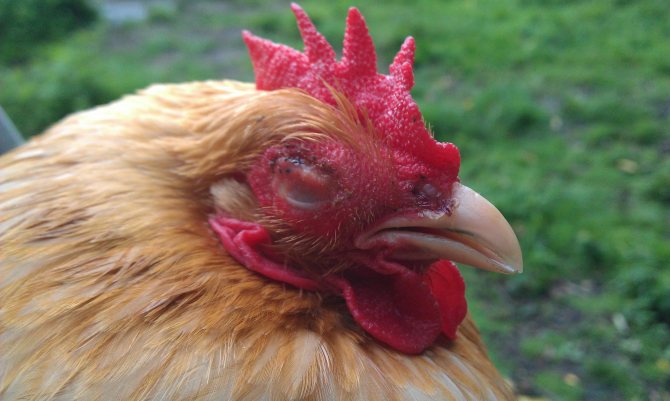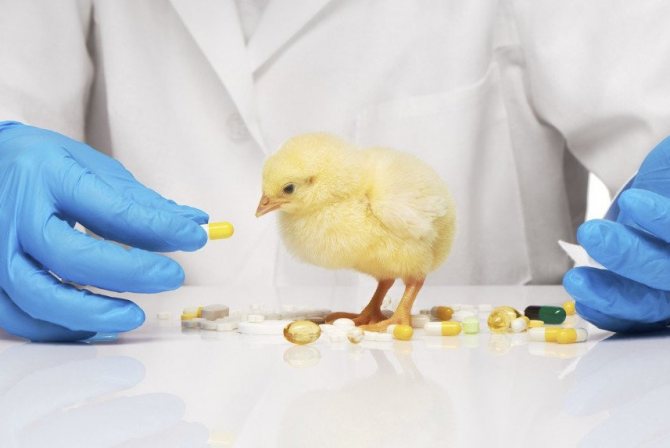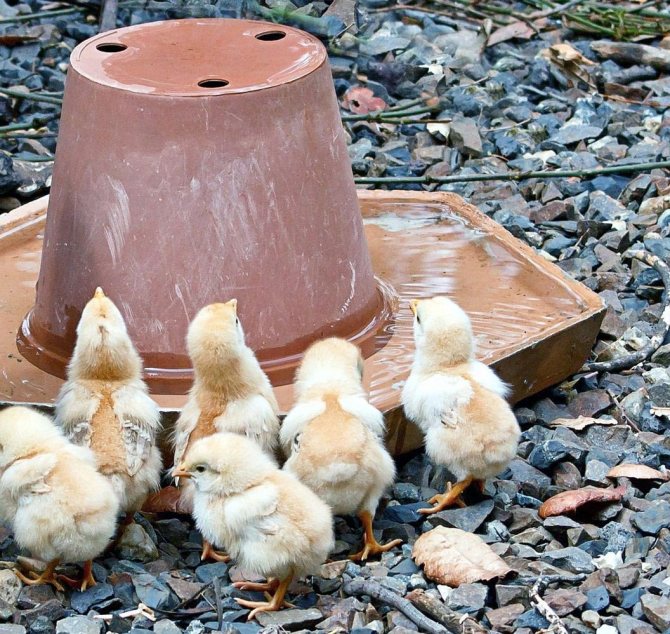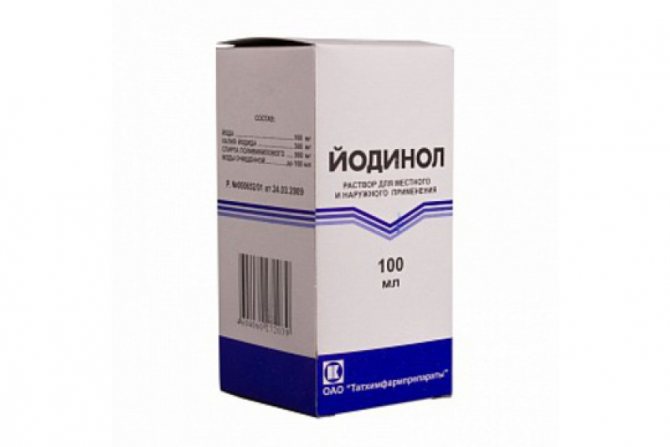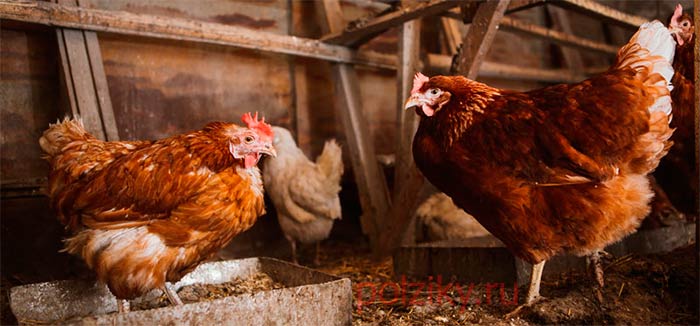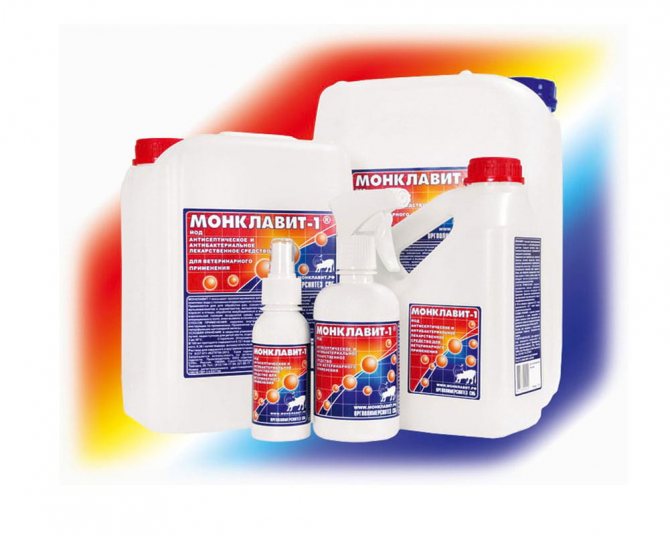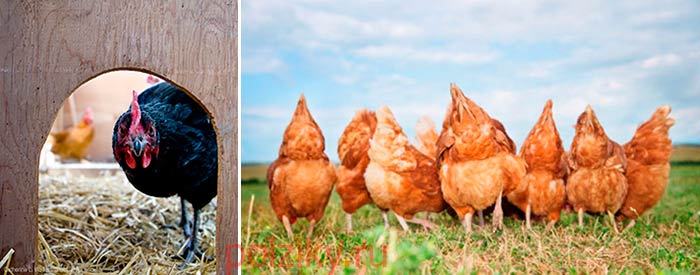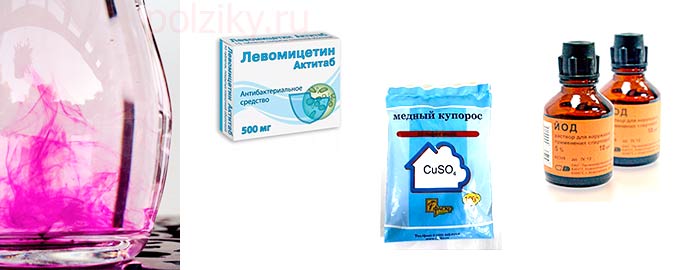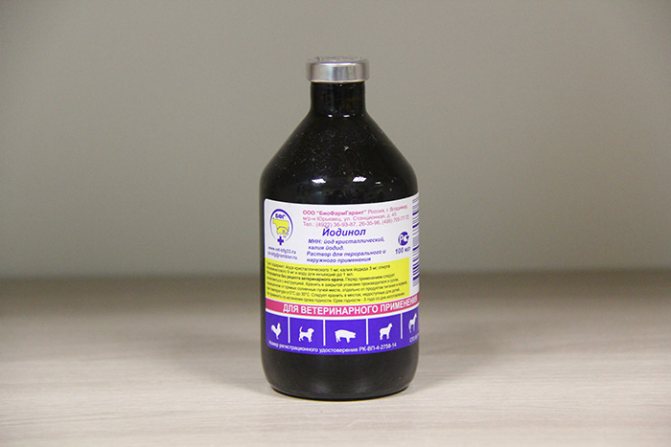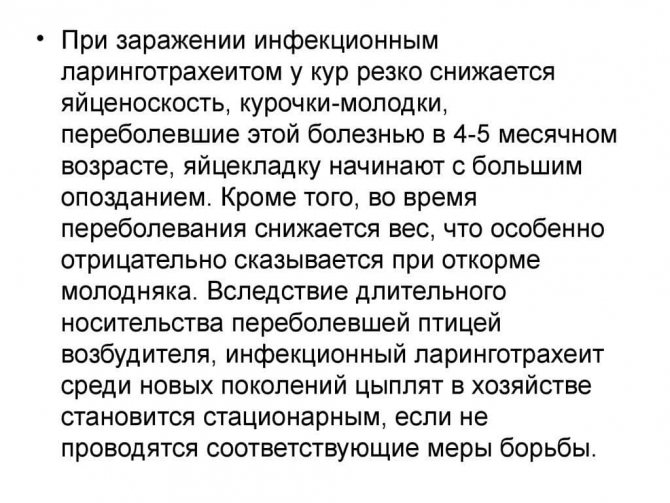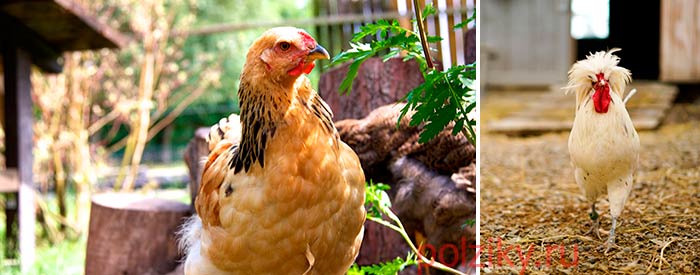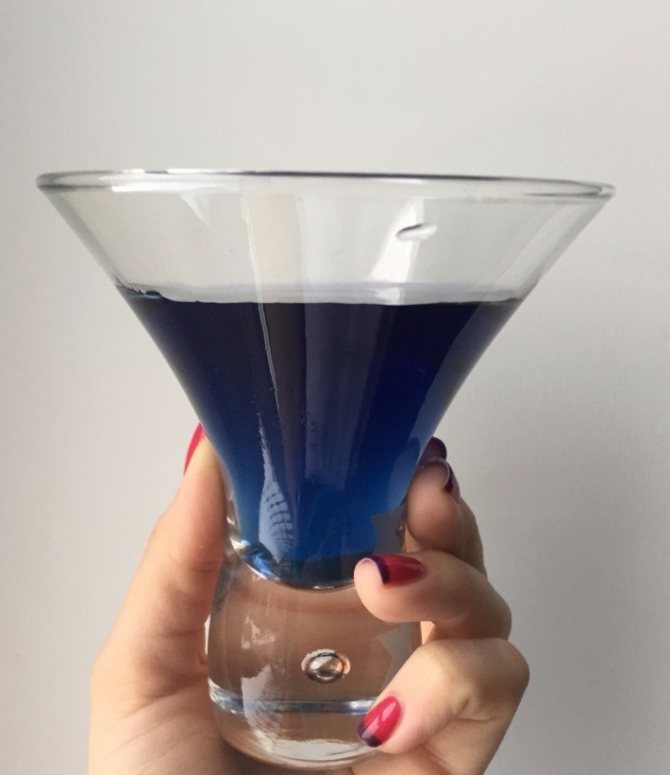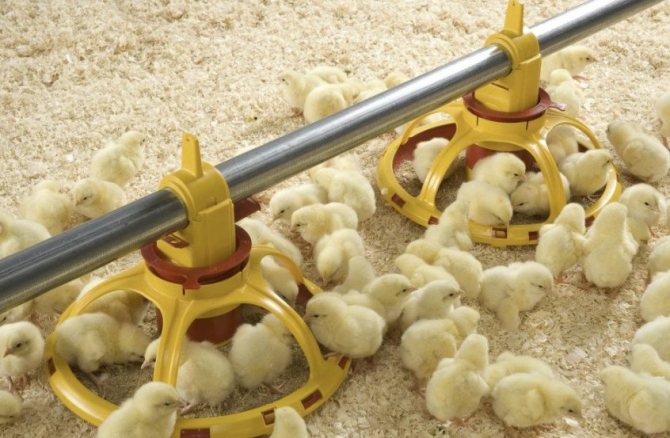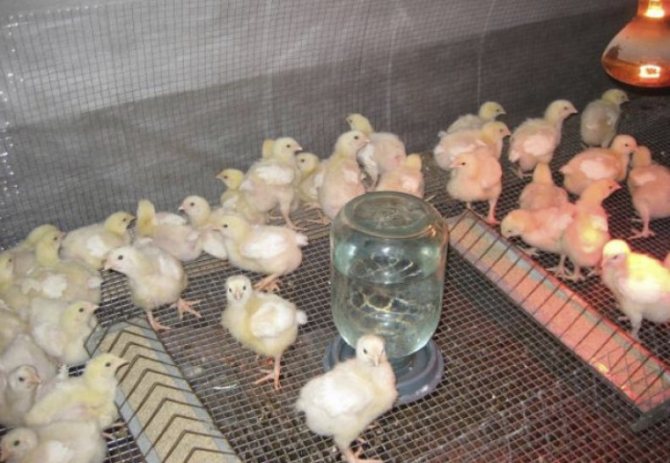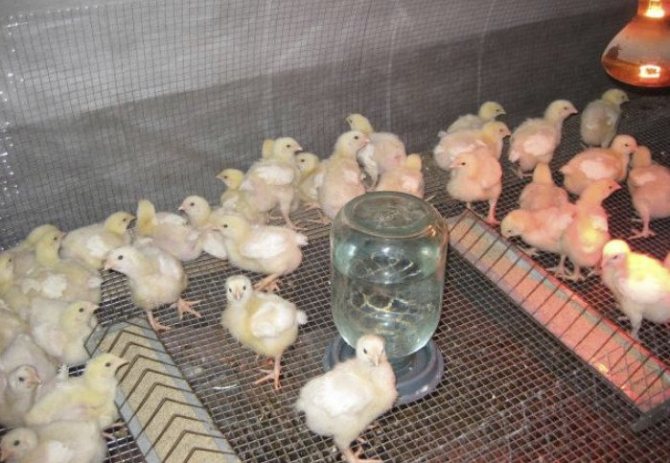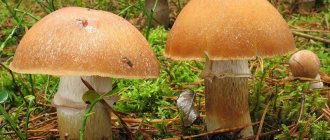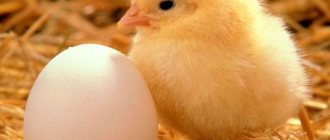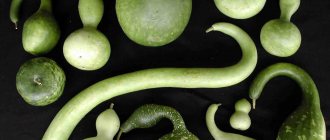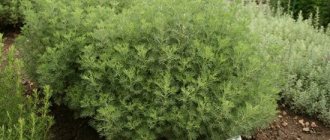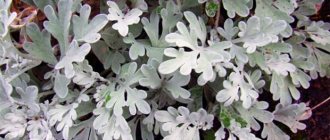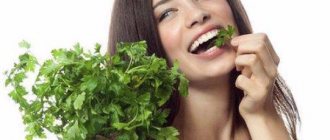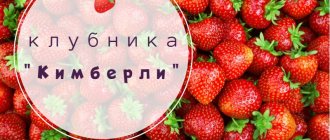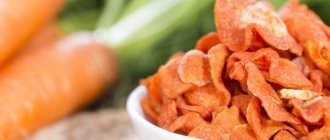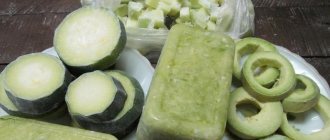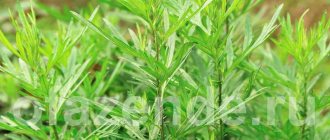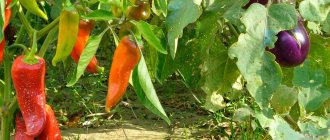Iodinol is popular at all times among farmers, poultry farmers who breed birds. This medicine is distinguished by its relatively low cost, prostate use, and effectiveness. Iodinol is used for turkeys, chickens, turkeys and other types of poultry.
This article contains all reliable information about the properties and use of the drug. After reading to the end, a person will find out the recipe for homemade blue iodine, dosage, proportions, and receive advice and recommendations from specialists.
Description of the drug
Iodinol for poultry is an antimicrobial medicine used in veterinary medicine to treat chickens and other birds. The drug is also called blue iodine. The medication received this name because of its rich blue color.
The medicine is produced in the form of a solution, the main element is iodine. In addition, the composition contains polyvinyl alcohol compounds and potassium iodide.
The drug has a pronounced iodine odor; when shaken, the drug forms a foam. Sold in glass bottles, tightly closed with a rubber lid and cap.
Iodine checker
Iodine checker - powder or tightly compressed tablets containing about 40% of the active substance and 60% of auxiliary components necessary for normal combustion and the release of iodine vapor.
See also
Instructions for using infrared lamps for heating a chicken coopRead
Iodine checkers are used for the following purposes:
- Disinfection of premises for keeping chickens.
- Sanitation (health improvement) of the air in the chicken coop.
- Treatment of pulmonary (respiratory) infectious and non-infectious diseases.
This drug is used by laying out packages of powder or tablets at several points in the house and setting it on fire with an ordinary household match. At the same time, all doors and windows must be tightly closed, and the existing artificial forced ventilation must be turned off.
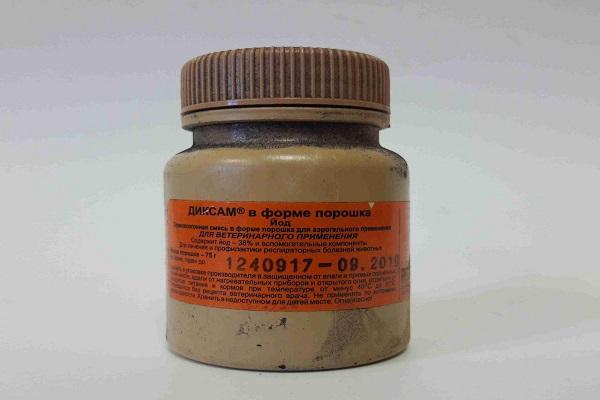
Before using the drug, its dose, as well as the duration of its treatment of the poultry house, is selected from the instructions for use offered to each container with powder or tablets.
Properties
The main component in the composition of Iodinol is iodine crystals, therefore the drug has an antimicrobial effect without irritating the mucous tissues. The main advantage of using the product for chickens and other birds is considered to be excellent tolerance even in birds weakened by the disease.
In addition, Iodinol is not a toxic drug, it is excreted from the body of the bird in a natural way. The product contains no harmful and dangerous substances, hormones and antibiotics. When used, the medication does not accumulate in the organs, but, on the contrary, promotes the removal of toxins and toxins.
Pharmacology
People often call this substance blue iodine. There is no international non-proprietary name. The drug is safe to use, since it does not contain toxic compounds, antibiotics, vaccines, hormones and other substances that are sold strictly by prescription.
In the composition of "Iodinol" there are such substances (per 1000 cm³):
- iodine - 1 g;
- polyvinyl alcohol - 9 g;
- potassium iodide - 3 g;
- purified water (as a solvent) - the rest of the volume (approximately 980-990 g per 1000 cm³).
Refers to the pharmacological group of antiseptics.The main active ingredient is iodine, which, upon contact with the epidermis, has a resorptive effect:
- takes an active part in metabolic processes;
- when combined with L-tyrosine, it produces thyroxine, an important hormone of the thyroid gland, the main function of which is to activate metabolic processes;
- accelerates the decomposition of complex organic compounds;
- takes part in the breakdown of various proteins.
Due to the presence of polyvinyl alcohol in the composition, iodine is retained in the body. Thus, alcohol prolongs the beneficial effects of iodine on the body. In addition, polyvinyl alcohol reduces the irritant effect of iodine on body tissues. It is important that it is well tolerated even by severely emaciated sick chickens.
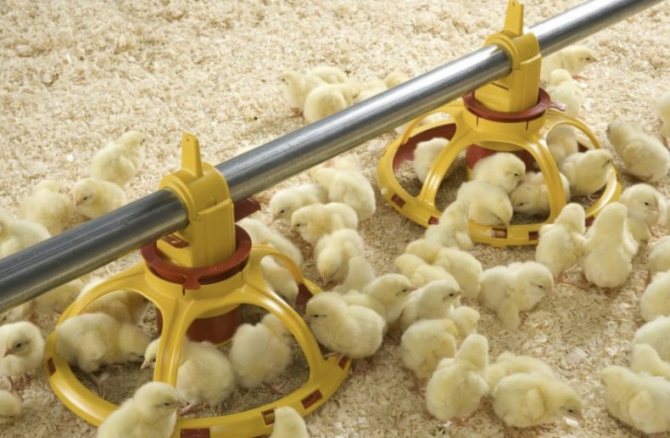

If the intestines of chickens are affected by bacterial microorganisms, then "Iodinol" can actively counteract them. Moreover, this drug is highly active in the fight against both gram-positive and gram-negative strains.
What is Iodinol used for?
Blue iodine is considered first aid for poultry diseases and is present in almost every farmer's medicine cabinet. Iodinol for chickens and other birds is prescribed for the treatment of the following ailments:
- gastrointestinal diseases;
- skin diseases;
- stomatitis;
- purulent otitis media;
- endometritis;
- vaginitis;
- coccidiosis and respiratory infections.
It is noteworthy that the agent can be safely used to treat laying hens, since the drug is recognized as non-toxic and does not accumulate in meat and eggs.
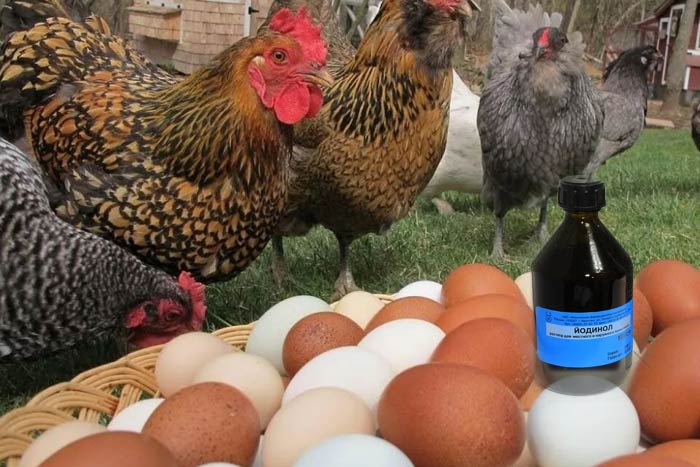

First aid kit for turkey poults
When the poultry breeder systematically monitors the health of the turkey poults, he completes the first aid kit. Medicines are placed in it to treat the bird and accompany it from the first days after emerging from the egg.
During active growth, chicks are attacked by various viruses, bacteria and fungi. Therefore, the first-aid kit should contain drugs that can help with those pathologies that are characteristic of turkey poults.
In the absence of instructions for the drug, it is easy to harm birds during treatment.
Read also: Diarrhea in broiler chickens is white, brown, bloody, what and how to treat, video
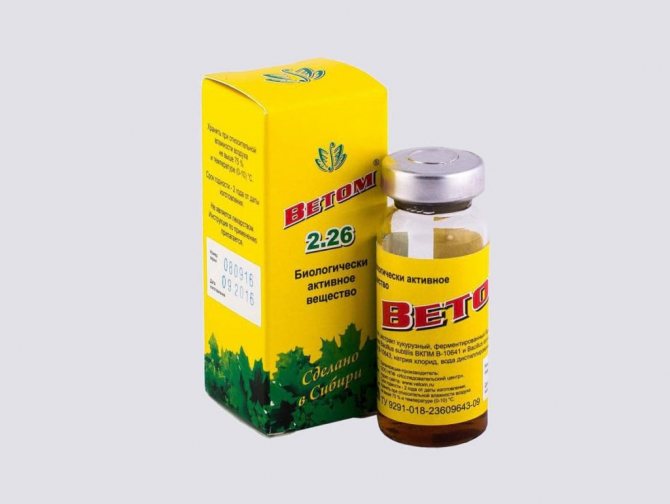

There are several kits available to help protect chicks from common infections. In addition, these products help to improve bird performance and speed up growth.
For a monthly course from the first days of life, turkey poults use the following drugs:
- Vigozin improves metabolism and stimulates growth of individuals.
- Vetom increases the body's immune defenses.
- Vitamins with various trace elements and amino acids. They improve the digestibility of the turkey poultry feed.
- Glucose is essential for building protection against various diseases.
- Tylosin Tartate is an antibitotic that successfully cope with streptococci, mycoplasmosis and colibacillosis.
- Coccidiostatics are given to birds to treat or prevent coccidiosis.
Such tools are available in every turkey breeder's medicine cabinet.
As you can see, Iodinol and Monclavit-1 are effective means for getting rid of various diseases in layers. They are used for pathologies of the gastrointestinal tract and reproductive system, lesions of the dermis.
Makarov Ivan Vasilievich
Hereditary poultry farmer, owner of a poultry farm, graduated from St. Petersburg State Agrarian University with honors, author of articles in specialized publications
The effectiveness of the tool
The high performance of Iodinol for chickens and other birds is due to the following effects:
- Anti-inflammatory. The medication resists the development of inflammatory processes and slows down the spread of existing ones.
- Antiseptic. Disinfects wounds and other skin lesions.
- Bactericidal. Since the product contains iodine, the drug negatively affects pathogenic microorganisms.
- Immunostimulating... The use of Iodinol strengthens the immune system, reduces the likelihood of developing various diseases.
Instructions for use for birds
When using Iodinol for the treatment of adult birds and young chicks, it is important to strictly follow the instructions and observe the dosage. When calculating the dosage, you need to take into account the age and weight of the bird, as well as the disease.
In the treatment of skin problems, Iodinol is used undiluted. The tampon is moistened in the medicine and the affected area is treated, previously cleared of secretions.
To eliminate coccidiosis in turkey poults and other birds, Iodinol is stirred in water at a rate of 1: 0.5 and the prepared solution is offered to the birds. Duration of admission is 7 days. The dose varies depending on the age of the affected individuals:
- chicks up to 1 month old - 0.5 ml 3 times a day;
- mature chickens, turkeys and other types of poultry - 1 ml 3 times a day.
Pullorosis in young animals is eliminated according to the same scheme, the course of treatment is 8-10 days.
When using Iodinol in order to prevent diseases, the dosage is 0.3-0.5 ml once a day. Duration of admission is on average 15 days. Iodinol is especially beneficial in the autumn-winter period, when birds suffer from vitamin deficiency.
What should be the water for chickens?
In the wild, birds can drink from lakes, rivers, puddles, any available body of water. And people have long noticed that the flowing waters of rivers and streams, springs, and sometimes certain places in reservoirs with stagnant water, where crustaceans are found, are especially fond of them, medicinal herbs grow along the coast (for example, calamus, cattail, string, arrowhead). Animals are able to independently find safe places for watering or unique reservoirs, where medicinal infusions are created by nature itself in a confined space.
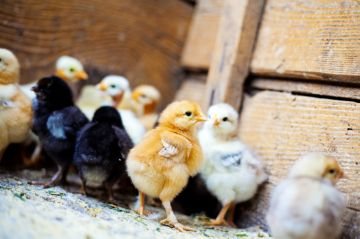

In personal subsidiary plots, where no instinct will help the bird find everything necessary for normal development, maintaining the health of the bird is the task of the owners. It should be remembered that the water exchange in laying hens is 2 times more intense than in broilers, each of them drinks about 1 glass of water (250 g) per day in comfortable conditions at an air temperature of 18 to 22 degrees. Moreover, if feeding is carried out only with dry granular mixtures, the rate is increased by 20-30%:
- Day-old chickens are offered water heated to 30 degrees.
- From one week of age, the temperature should be at least 25 degrees.
- After 21 days of life, it can be reduced to 17-19 degrees.
- From 2 months of age, the bird is able to drink cold water normally - from 10 degrees.
Important: if you give chickens with heated water for a long time, digestive upset and bowel disorders are likely.
The benefits of cold drinking are also that it reduces the amount consumed, and therefore the content in the droppings, which helps to maintain normal humidity in the poultry houses. But access to filled drinking bowls should always be free.
How to cook yourself
For external use, it is not necessary to use purchased Iodinol - you can prepare the product yourself. Despite the fact that the properties of a home-made drug are not inferior to its industrial counterpart, the shelf life of a home-made solution is much shorter. The mixture is suitable for consumption as long as it retains a rich, bright blue hue.
During self-preparation of Iodinol, for safety reasons, you must follow the recipe and observe the required proportions of ingredients.
Method 1
The method was developed by V. Mokhnach and is popular with poultry farmers due to its easy recipe. How to cook:
- In 50 ml of water, 10 g of starch are diluted, mixed and 10 g of sugar and 0.4 g of citric acid are added. The mixture is stirred again.
- A thick mixture is boiled from the resulting solution. For this, a starch mixture is added to 150 ml of boiling water. The medicine is cooled and 1 teaspoon of a 5% solution of iodine is added, mixed.The mixture should turn blue.
The finished product must be stored in a closed container.
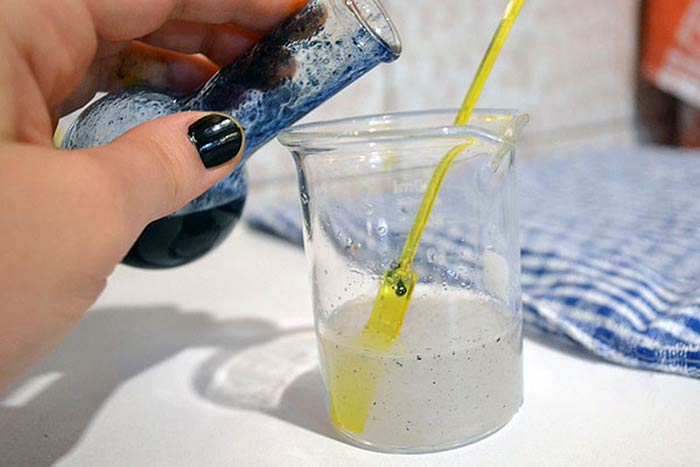

Method 2
Another method of preparing Iodinol solution is similar to the first, with the exception of a couple of nuances:
- In 50 ml of water add 10 g of starch and 1 teaspoon of 5% iodine solution, stir.
- A starch-iodine mixture is poured into 200 ml of boiling water, stirring constantly. The result should be blue Iodinol.
Side effects and contraindications
Veterinarians do not recommend using Iodinol for chickens and other types of poultry if they have:
- individual intolerance to any components of the drug;
- thyrotoxicosis;
- stool disorders;
- organ pathology;
- tuberculosis.
With proper application and compliance with the instructions, Iodinol does not cause side effects. If the dosage is violated, then birds may experience:
- rash;
- runny nose;
- bad state of health;
- burn of mucous membranes.
Iodinol poisoning leads to pulmonary edema, pneumonia and bronchospasm. In case of violation of the dosage, it is necessary to force the birds to drink milk, and then rinse the stomach.
Advice
To disinfect the chicken coop, you can use a checker-type agent. Checkers contain iodine in crystallized form and additional substances. They come in tablet or powder form. When cleaning a chicken coop, it is advisable to use this product to remove harmful organisms from the litter. Iodine vapors can penetrate deep into cracks in floors and perches and clean them deeply.
Experienced poultry farmers recommend using an iodized checker in the following situations:
- If you urgently need to cleanse the premises from infections, for the prevention of infectious diseases.
- If it is necessary to get rid of diseases of the respiratory tract of poultry, laryngitis, bronchitis and pneumonia, leading to a decrease in productivity and growth rates, in addition to the use of medications, it is possible to use iodinol in the form of checkers.
For a room with an area of 0.5 sq. km, you will need about 6 tablets or 50 grams of powder. When ignited, iodine vapors will begin to be released, which have a disinfecting ability.
Experienced breeders recommend iodinol as a universal inexpensive remedy, with the purchase of which usually there are no problems, among other things, bacteria and viruses do not develop resistance from iodinol, so you can use it an unlimited number of times.
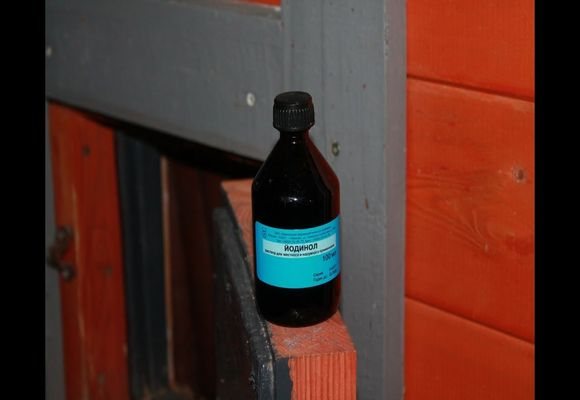

Among chicken farmers, blue iodine is considered very effective. It's easy to make and use. The tool is intended not only for treating injuries to the skin, but also suitable for the internal organs of birds.
Precautions
When working with medication, you should not forget about the precautions:
- Before starting work, wash your hands with detergent and wear protective gloves.
- Do not use the solution for domestic purposes.
- After completing work, discard protective gloves and wash your hands.
- Do not allow the product to get into open areas of the body, mucous membranes and eyes.
If, during the preparation of the medicinal solution, the drug gets into the eyes or on the skin, you need to wash off the remnants of the product as soon as possible by rinsing the affected area abundantly. After that, you should consult a doctor.
special instructions
Iodinol is recognized as a non-toxic drug, so the meat and eggs of birds using the medication can be eaten without fear. The main component of the drug quickly leaves the body without accumulating in tissues and organs.
The drug should be stored at a temperature not exceeding 25 ℃. Shelf life is 3 years. The diluted solution can be used within two days.
Iodinol is an effective remedy used to eliminate skin ailments and gastrointestinal diseases.The drug has high efficiency, low cost and is harmless to birds, therefore it can be used for chicks and layers.
Popular questions
Questions about watering layers arise not only among beginners who have just started to engage in subsidiary farming. Experienced poultry farmers also try to constantly learn new things, and the variety of laying hens breeds requires you to constantly be aware of all the secrets of their successful breeding.
How and what to water chickens for disease prevention?
Once a month, chickens can be watered with a pink solution of potassium permanganate. It is poured into drinking bowls for half a day, and then simply replaced with plain water. Potassium permanganate helps to fight intestinal infections, disinfects, kills viruses. The solution is suitable for the prevention of salmonellosis, which is dangerous for humans.
For the prevention of infectious diseases, 1 tablet of Levomycetin can be dissolved in 5 liters of water: such a solution is given 1 time per quarter to avoid inflammatory diseases.
Important: you cannot give a solution of potassium permanganate and an antibiotic at the same time, one of the remedies is given at the beginning of the month, the other at the end. Within 3 days after prophylaxis with Levomycetin, it is not recommended to eat chicken meat.
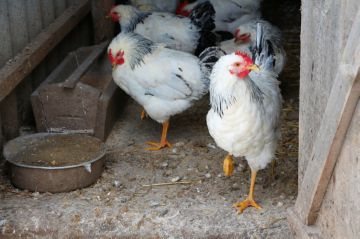

An excellent prevention of coccidiosis, a disease that can destroy all livestock in a poultry house within a few days, is a solution of copper sulfate: 3 tsp. copper sulfate per 1.5 liters of water. Pour it into drinkers for 3 days, a week later - another 1 course for three days. It is worth taking 2-3 courses a year.
Multivitamins are necessary to increase the body's resistance to disease, improve egg production, and improve overall well-being. Any veterinary pharmacy will tell you which vitamins are best at what time. For every liter of water, you need 1 ml of multivitamins. This solution is given once a month.

